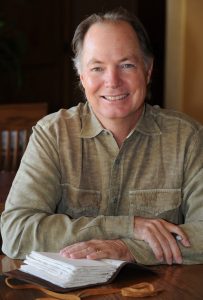TUESDAY, JANUARY 9, 2018
David Cook is a mental coach, working with athletes in the NBA, Major League Baseball, and on the professional golf tours. He is the author of Golf’s Sacred Journey: Seven Days at the Links of Utopia and its sequel, Johnny’s U.S. Open. Both books, as well as The Psychology of Tournament Golf, are available here.
David, it has been 12 years now since you wrote Golf’s Sacred Journey: Seven Days at the Links of Utopia. Johnny, the beloved teacher in that book (and then the movie) offered a lot of great lessons. Which one has stuck with people most through these years?
“The one that stops everybody is the one at the end of the book: Does it really matter? What does matter? The first sentence of the book is, How can a game have such an effect on a man’s soul? Johnny really answers it with that last thing—does it really matter?
“People care about what they do. We want to be good at what we do. And victory is a good thing, it’s not a bad thing. But the ultimate purpose is so much bigger than whether the putt went in or not. In the book, the main character, who got named Luke in the movie, got the message from Johnny and was able befriend a young man named Joe and basically disciple him, or share the gospel, for the first time, and it changed this young man’s life. That was something Luke had never had in his life, which was the victory of seeing another man’s life transformed because he was brave enough to approach this hothead and listen instead of just condemning him. I think that was Johnny’s angle the whole time—to fill this kid with fulfillment so that he might share it with someone else, so that the true victory could happen, which was to see Joe and his wife, who had been estranged, come together. Then a few minutes later, Luke was over the putt to win the tournament, and that’s when the line came, Does it really matter?, because what really mattered was that he had affected another man’s life. That’s eternity versus temporary victory. In the end it was the question of, Are there going to be any feet in heaven because of your life? Are you going to allow God to work through you? When we understand that’s the only thing that matters, then God is able to work through us. We don’t do it; we just get to live the love of God over someone else and they receive it. There were a lot of cool lessons in there, but I think the ultimate one is that.”
When I ask myself, Does it really matter?, it’s going to change the way I live my life. Does it change the way I play golf?
“I hope so.”
When you see people ask these bigger life questions, what does it do to them in these lesser pursuits, like a round of golf or something else they enjoy?
“I was telling a guy this recently. He said, ‘I’ll never play with you, because you’re too good.’ That’s all relative, because I’m horrible compared to Tiger Woods, but he’s a 20-handicapper and he doesn’t want to embarrass himself with me. My comment to him is the answer to your question. I said, ‘The only reason I play golf now is to build relationships with men like you.’ It’s all about spending time with another man in a really cool place and I could care less if I make a birdie, bogey, or double bogey, and I could care less if your swing’s good or bad. What I really care about is that I have a privilege to spend four hours with another man. If my anger or my emotions come between that—I’ve told guys they need to quit playing golf! I have l literally told them, ‘You can’t let the enemy steal your soul by going out and representing yourself by getting angry.’ I once traveled 1,000 miles to see a guy who had ruined my day on the golf course. I met him at his house and I told him, ‘You’re the nicest man I know sitting in a room like this. You’re a dear friend. But you know what? You’re the biggest jerk I’ve ever seen on a golf course, and I hope I never play with you again unless you change. And the other guys who played with you? They feel the same way. You’re too good of a man to ever let that happen again.’ I thought, OK, either he’s going to hit me, or he’s going to hear it. And he heard it.”
